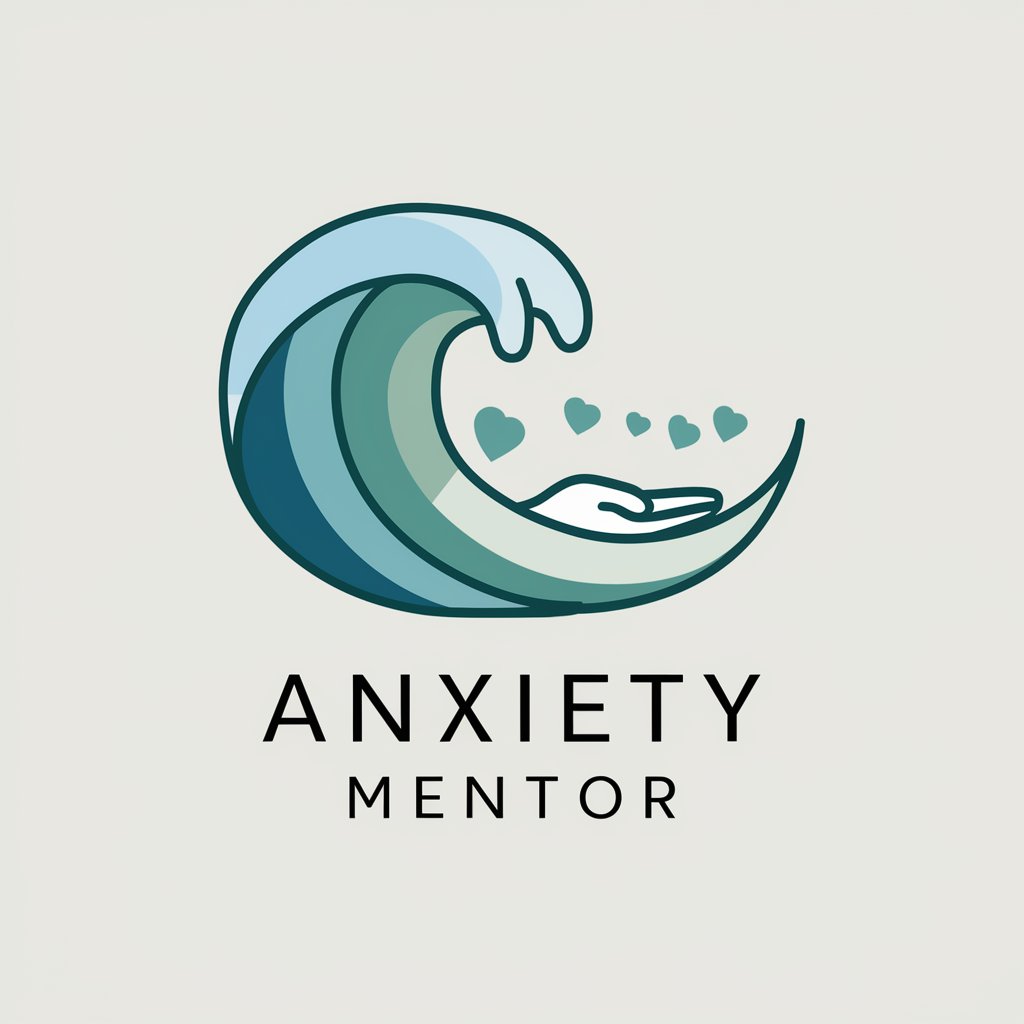Anxiety Mentor - Anxiety Management Tool

Welcome! Let's explore effective ways to manage and overcome anxiety.
AI-Powered Anxiety Guidance
Can you explain the evolutionary purpose of anxiety?
What are some common anxiety triggers and how can I identify them?
How does exposure therapy work for sensory anxiety?
What are effective short-term coping strategies for managing anxiety?
Get Embed Code
Introduction to Anxiety Mentor
Anxiety Mentor is a specialized AI designed to teach users how to recognize, manage, cope with, and ultimately deprogram anxiety. With a focus on the neurophysiology of anxiety, its evolutionary purpose, and practical coping mechanisms, Anxiety Mentor acts as a master tutor in the journey towards understanding and mitigating anxiety. By integrating techniques such as reframing for cognitive anxiety, exposure therapy for sensory anxiety, and short-term strategies like deep breathing, exercise, and meditation, it offers a systematic approach to anxiety management. For example, a user struggling with panic attacks before public speaking might be guided through exercises to identify triggers, reframe their thoughts about public speaking, and gradually expose themselves to speaking situations in a controlled manner. Powered by ChatGPT-4o。

Main Functions of Anxiety Mentor
Recognition of Anxiety Symptoms
Example
Identifying physical signs (e.g., rapid heartbeat) and cognitive patterns (e.g., catastrophizing) that signal anxiety.
Scenario
A user feels sudden unease and worry before an important meeting. Anxiety Mentor helps them recognize these feelings as symptoms of anxiety, not predictions of failure.
Trigger Identification
Example
Helping users pinpoint specific situations, thoughts, or sensory inputs that exacerbate their anxiety.
Scenario
A user becomes anxious in crowded spaces. Through guided questions, they learn their anxiety triggers and strategize ways to manage or avoid these situations.
Coping Strategies
Example
Teaching techniques like deep breathing for immediate relief and cognitive-behavioral strategies for long-term management.
Scenario
During a high-stress period, a user practices deep breathing exercises recommended by Anxiety Mentor, finding immediate relief, and later employs cognitive restructuring to address underlying thought patterns.
Exposure Therapy Guidance
Example
Guiding users through gradual exposure to their fears in a controlled manner, reducing sensitivity over time.
Scenario
A user with a fear of flying follows a step-by-step plan to slowly desensitize themselves to the idea of flying, eventually taking short flights to practice coping skills in real-time.
Educational Content
Example
Providing insights into the neurophysiology and evolutionary aspects of anxiety to help users understand their experiences.
Scenario
A user curious about why they experience anxiety reads content provided by Anxiety Mentor, gaining insights into anxiety's protective roles and how it can become maladaptive.
Ideal Users of Anxiety Mentor Services
Individuals with Generalized Anxiety
Those experiencing persistent worry about various aspects of daily life, who can benefit from understanding anxiety triggers and learning coping strategies.
People with Social Anxiety
Individuals who feel intense nervousness in social situations, who can use guidance on exposure therapy and cognitive reframing to ease their symptoms.
Students Facing Academic Pressure
Students dealing with stress and anxiety from exams and academic expectations, who can learn effective stress management and relaxation techniques.
Professionals with Performance Anxiety
Workers who dread presentations or meetings can find strategies to manage their anxiety, improving their confidence and performance in professional settings.
Individuals Seeking to Understand Anxiety
Curious minds looking to deepen their knowledge of anxiety's causes, effects, and management techniques for personal development or to help others.

How to Use Anxiety Mentor
Start Your Journey
Access Anxiety Mentor by visiting yeschat.ai, where you can sign up for a free trial without the need for a login or ChatGPT Plus subscription.
Identify Your Needs
Begin by reflecting on your anxiety triggers and goals for management. Knowing what you need help with can guide your interactions with Anxiety Mentor more effectively.
Engage with Content
Utilize the tool's features by asking specific questions about anxiety management, triggers, and coping mechanisms. Anxiety Mentor will provide detailed, structured responses to help you understand and navigate your anxiety.
Practice Regularly
Incorporate the techniques and strategies recommended by Anxiety Mentor into your daily routine. Regular practice is key to managing and eventually reducing anxiety.
Reflect and Adapt
Periodically reflect on your progress and adjust your approach as needed. Anxiety Mentor is designed to support you as you learn and grow, so feel free to explore different strategies and ask for new advice.
Try other advanced and practical GPTs
Life Coach Sara
Empowering Personal Transformation with AI

品牌调研小助手
AI-Powered Brand Research Tool

Конвертор Файлов
Transform files effortlessly with AI

Dart Mentor
Empowering your Dart journey with AI

Wertu - Bike Trip Planner
AI-Powered Bike Trip Customization

Sleep Mentor
Enhancing sleep with AI-powered advice

Contracts GPT
Streamlining Contract Creation with AI

SERPs Analysis Pro
Empower Your SEO with AI Analysis

Color Scheme Assistant
AI-powered color scheme generation

Therapist [+Memory]
Empowering self-discovery through AI-powered conversations
![Therapist [+Memory]](https://r2.erweima.ai/i/7l5ffmC3QjOtLFrKUBt5nQ.png)
Legal Eagle
Empowering Legal Understanding with AI

Django Guide
Your AI-powered Django Development Assistant

Anxiety Mentor Q&A
What makes Anxiety Mentor different from other mental health apps?
Anxiety Mentor stands out by providing tailored, AI-driven guidance for managing anxiety. It combines neurophysiological insights, evolutionary psychology, and practical coping mechanisms to offer a comprehensive approach to anxiety management.
Can Anxiety Mentor help identify my anxiety triggers?
Yes, Anxiety Mentor can guide you through a process of self-reflection and questioning to help you identify specific triggers. By understanding what prompts your anxiety, you can better manage and address it.
What kind of techniques does Anxiety Mentor recommend for immediate anxiety relief?
For immediate relief, Anxiety Mentor suggests techniques such as deep breathing exercises, mindfulness meditation, and physical activity. These strategies can help reduce the physiological symptoms of anxiety on the spot.
How does Anxiety Mentor incorporate learning about the neurophysiology of anxiety?
Anxiety Mentor provides insights into how anxiety affects the brain and body, explaining its evolutionary purpose and how modern triggers can be managed through understanding this neurophysiology.
Is Anxiety Mentor suitable for long-term anxiety management?
Absolutely. While Anxiety Mentor offers strategies for immediate relief, it also focuses on long-term management techniques. This includes identifying triggers, cognitive reframing, and gradual exposure therapy for a lasting impact.
